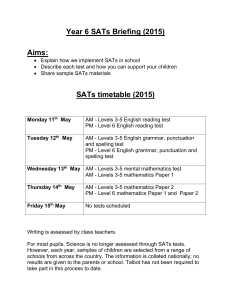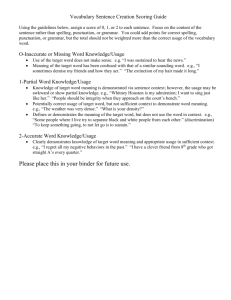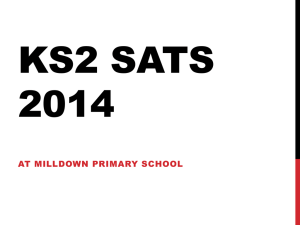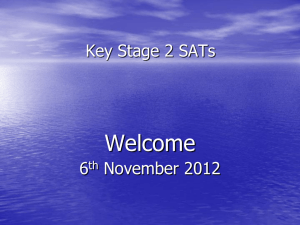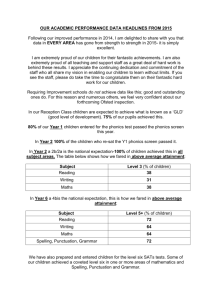File
advertisement
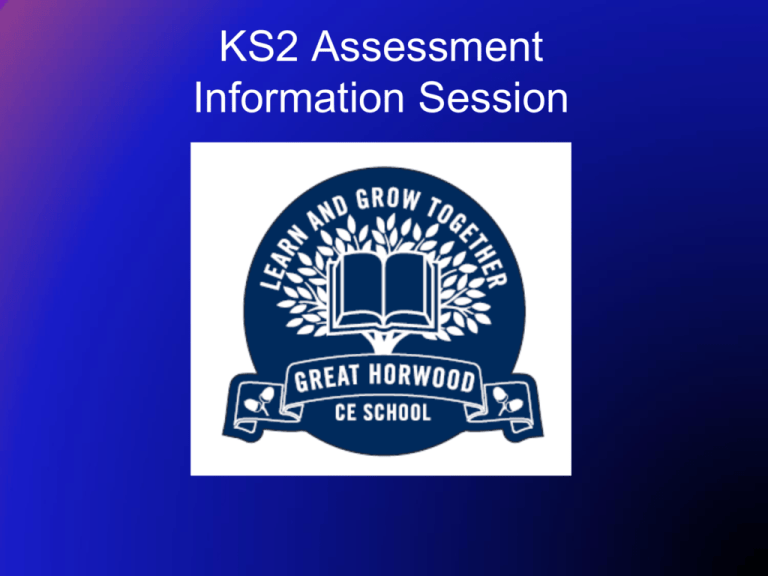
KS2 Assessment Information Session Aims of the session: • To provide information about KS2 SATs • To answer any questions about KS2 SATs • Share ideas about how parents can help children at home Purpose of the tests: • The Key Stage 2 tests are designed to test children’s knowledge and understanding of the Key Stage 2 programmes of study. • They provide a snapshot of a child’s attainment at the end of a Key Stage. • Each child is awarded a level in Maths, Reading, Writing, Grammar, Punctuation and Spelling. • Assessment information is passed to child’s secondary school What levels are expected? •Level 2 – these children will not be entered for the tests •Level 3 – below age related expectation •Level 4 – age related expectation •Level 5 – above age related expectation Mathematics • Paper A – no calculator – 45 minutes • Paper B – no calculator – 45 minutes • Mental maths • Some questions are worth one mark and therefore accuracy is important. • Other questions are worth two marks and even if the answer is wrong, a mark may be given for correct working. * word problems need to show all steps • Teachers may read questions in both written papers to pupils if asked. Mental Maths Typical mental maths questions: 5 second questions: What time is it half an hour after ten-fifteen? 10 second questions: The temperature was three degrees Celsius. It goes down by eight degrees. Write the new temperature. 15 second questions: Four oranges cost ninety-five pence. How much do 12 oranges cost? Home/School support for Maths School: Home: • Small group interventions to help children across all levels: in school time and after school • Differentiated teaching / activities in class • Quick-fire whole class boosters • Go through maths work in CGP books regularly, discussing errors and strategies (weekly or twice-weekly) • Practice times tables at every opportunity! English • Writing – teacher assessment (moderated) • Reading – test paper – 1 hour total • Grammar, punctuation and spelling • Short answer questions – 45 minutes • Spelling test – 15 minutes Writing Home/School support for Writing School: Home: • Opportunities to read and be read to, to enhance language skills • Cross curricular opportunities to write • Individual targets and support in improving writing • Read a variety of texts regularly, including non fiction • Discuss all written homework tasks with your child, encouraging them to edit and improve their own work. Reading •There are 4 main types of questions on the reading paper: •Literal – answer is there in the text •Deductive – look for clues •Inferential – read between the lines •Authorial intent – e.g. why does an author use a particular word Sentence from: ‘A Day in the English Countryside As the afternoon light started to fade, the cow stopped eating grass, stood instead with its head over the gate and gazed expectantly down the lane. 1. How light was it? (Literal) 2. What three things did the cow do? (Literal) 3. What time of day was it? (Deductive) 4. Where was the cow? (Deductive) 5. What do you think the cow was expecting? (Inferential) 6. What strategies does the writer use to give the reader so much information in a single sentence? (Authorial intent) Home/School support for Reading School: Home: • Read with your child • Regular reading and regularly, asking inference discussion of and deduction questions. comprehension papers • Share different types of text, • Reading marathon to discussing layout, etc encourage children to read a wide range of texts • Provide encouragement and opportunities for quiet • Class text read to and reading at home. with children. Grammar, Punctuation and Spelling • 45 minutes test on grammar Spelling • Worth 20 marks out of 70. • Can affect the overall level obtained Home/School support for Grammar, punctuation and spelling School: Home: • Grammar and punctuation included in every English lesson • Booster daily sessions • Daily phonics/spelling sessions • Encourage spelling homework that practices spellings and explores rules. • Correct verbal grammar! What does teacher assessment involve? •Teacher assessment draws together everything the teacher or teachers know about a child, including observations, marked work and school assessments. •Teacher assessment is not a ‘snapshot’ like tests and is therefore more reliable. •There can be a difference between teacher assessment results and test levels. Example timetable Date Level 3-5 tests – Morning Level 6 tests - Afternoon Monday 11 May English reading test (60 mins) English reading test (60 mins) Tuesday 12 May English grammar, punctuation and spelling test (45 mins and 15 mins) English grammar, punctuation and spelling test (30 mins and 20 mins and 10 mins) Wednesday 13 May Mental mathematics test (20 mins) Mathematics - Test A (45 mins) Thursday 14 May Mathematics - Test B (45 mins) Mathematics - Paper 1 (30 mins) Mathematics - Paper 2 (30 mins) During SATs week: •Please ensure that your child is in school every day during SATs week. •Ensure that they are in school on time •Please don’t book anything during this week e.g. doctor’s appointments, holidays etc •If your child is ill, let us know immediately. How are we preparing children: • Working with children to address their individual needs • Taking a positive approach – celebration and rewards • A balanced curriculum – engaging children in ‘non-SATs’ topics! • Mock SATS 9th-12th March • Be Our Best week! Be Our Best week! • Whole-school approach to ‘being our best’ • Year 6 breakfast club • Afternoon activities to help children let off steam, relax, and have fun. How parents can prepare children: • Talk to us- about your child’s individual learning and emotional needs • Take an interest in learning and support homework • Ensure that children get enough sleep • Try to maintain attendance at school from now until SATs • Maintain a positive and balanced approach – remind your children how good they are at lots of different things! http://www.woodlands-junior.kent.sch.uk/maths/sats/index.html http://www.bbc.co.uk/bitesize/ks2/ http://www.cgpbooks.co.uk/online_rev/ks2_choice.asp Sumdog
